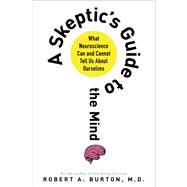
Robert Burton, MD is a physician, journalist, and author. A graduate of Yale University and University of California at San Francisco medical school, he was formerly chief of the Division of Neurology at Mt. Zion-UCSF Hospital and Associate Chief of the Department of Neurosciences. Burton’s work has appeared in Salon and the San Francisco Chronicle, among others, and he frequently is invited to speak about the brain, the mind, neuroscience, and philosophy of science. The author of On Being Certain: Believing You Are Right Even When You’re Not and three critically acclaimed novels, he lives in Sausalito, California.
Praise for A Skeptic's Guide to the Mind:
“Burton questions the fundamental assumptions of his field – with A Skeptics Guide to the Mind, he takes on the very foundations of cognitive science, leading readers to valuable insights in the process.”—Vinod Khosla, co-founder of Sun Microsystems
The New copy of this book will include any supplemental materials advertised. Please check the title of the book to determine if it should include any access cards, study guides, lab manuals, CDs, etc.
The Used, Rental and eBook copies of this book are not guaranteed to include any supplemental materials. Typically, only the book itself is included. This is true even if the title states it includes any access cards, study guides, lab manuals, CDs, etc.